FITA Magazine Vol. I / Invisible Atlas
Amor Towles
Interview by Francisco Teles da Gama
![]()
Photograph © David Jacobs
Amor Towles was born in Boston, but it is in Manhattan, New York, that you can find him at his desk writing compulsively, when inspiration haunts him and takes him on a new literary journey, always accompanied by a Martini.
As soon as he hears the first notes of Cole Porter he is fascinated by his inspired lyrics. The erudition and intellectual metaphors showed a different perspective to the young artist during the 1970s. This poetic milestone would mark his work forever.
He earned a BA from Yale College and a MA in English from Stanford University. He has been writing fiction from a young age, and even published the short story The Temptations of Pleasure in the Paris Review at the age of 25. But his work in the investment field eventually took him away from pen and paper for more than twenty years. It was thanks to the resounding success of Rules of Civility, published in 2011, that this author’s world changed. The book would be translated into more than 20 languages and received the 2012 Fitzgerald Prix, the year Towles decided to devote himself solely to writing, lucky for us. The talent had been in store since his youth, ready to blossom to captivate thousands of readers around the world. The fast pace of the writing, in a jazzy frenzy, lulls and surprises us. It is not surprising to find traces of Francis Scott Fitzgerald in the construction of the text and the characters, in addition to Towles immolating a glamorous and decadent time, such as the 1930s. This novel would spawn the spinoff Eve in Hollywood, about the life of the exuberant Evelyn Ross in Hollywood.
After recognition from critics and discerning readers, the author had open ground to present more novels, under the expectant gaze of the public. The novel A Gentleman in Moscow would cement this claim to literary apogee, with an exciting narrative that tells us so much about the beginning of the USSR, marked by public trials and the political paradigm shift. The forced imprisonment of Count Alexander Ilych Rostov in Moscow’s Metropol Hotel reminds us of the recent confinement of all civilization at home, even though the novel was published in 2016. This book was on the New York Times bestseller list, several newspapers hailed it as one of the best books of the year, translated into over 35 languages. On October 5 this year we will be able to read and contemplate his new novel, The Lincoln Highway, set in 1954 between Nebraska and New York.
We can still read several short stories Towles has published, where he always leaves us wanting to read more and more. A Whimsy of The World reveals the author’s admiration for Rome, Florence and Venice in an adventure in search of Ellie Watson’s whimsy. Katey Kontent, the main character in Rules of Civility, is a great reader and through her we can understand Amor Towles’ literary tastes, but now we will have the pleasure of meeting him in person.
Fill your Martini glass and get ready to enter the 21 Club in New York. Let’s talk.
![]()
Illustration © Timo Kuilder
When you started writing what literary references did you have in your imagination? In your books we find echoes of Evelyn Waugh and Truman Capote, for example.
I have not read the works of Capote or Waugh, but I am well versed in the works of Edith Wharton, F. Scott Fitzgerald, Ernest Hemingway, Dashiel Hammett, etc. As a novelist, I don’t pick a topic, research it, then write a book. Rather, I pick a topic in which I already have a longstanding fascination. In terms of Rules of Civility, I’ve always had a great interest in the period between 1900 and 1940 – because it was an era of such incredible creative combustion.
In retrospect, the pace of change in the arts and industry in the 19th century seems pretty glacial. Painting, music, the novel, architecture were all evolving, but at a pretty observable pace. Then in the span of a few decades you have James Joyce, Nijinsky, Cubism, Surrealism, Jazz, Henry Ford, Sigmund Freud, the Russian Revolution, movies, airplanes, skyscrapers and the general upending of received forms in almost every area of human endeavor.
Over the years, I listened to the music, saw the movies, read the novels and manifestos, lingered in front of the paintings. So rather than doing any applied research for the story, I relied on my longstanding familiarity with the period as the foundation for my invention.
![]()
Illustration © Timo Kuilder
The paperback is giving way to other means of reading, such as the ebook and the audiobook. What is the importance of the physical book to you as an artistic object and a reading experience?
I only read physical books – because I always read with a pen in hand to underline, take notes. I also am enamored with the book as a physical object. That said, I know readers for whom audiobooks are the most satisfying way to take in literature, and others who prefer ebooks. Any medium you choose is fine by me.
![]()
Illustration © Timo Kuilder
Amor Towles
The Boston Writer’s Jazz Solo
Interview by Francisco Teles da Gama
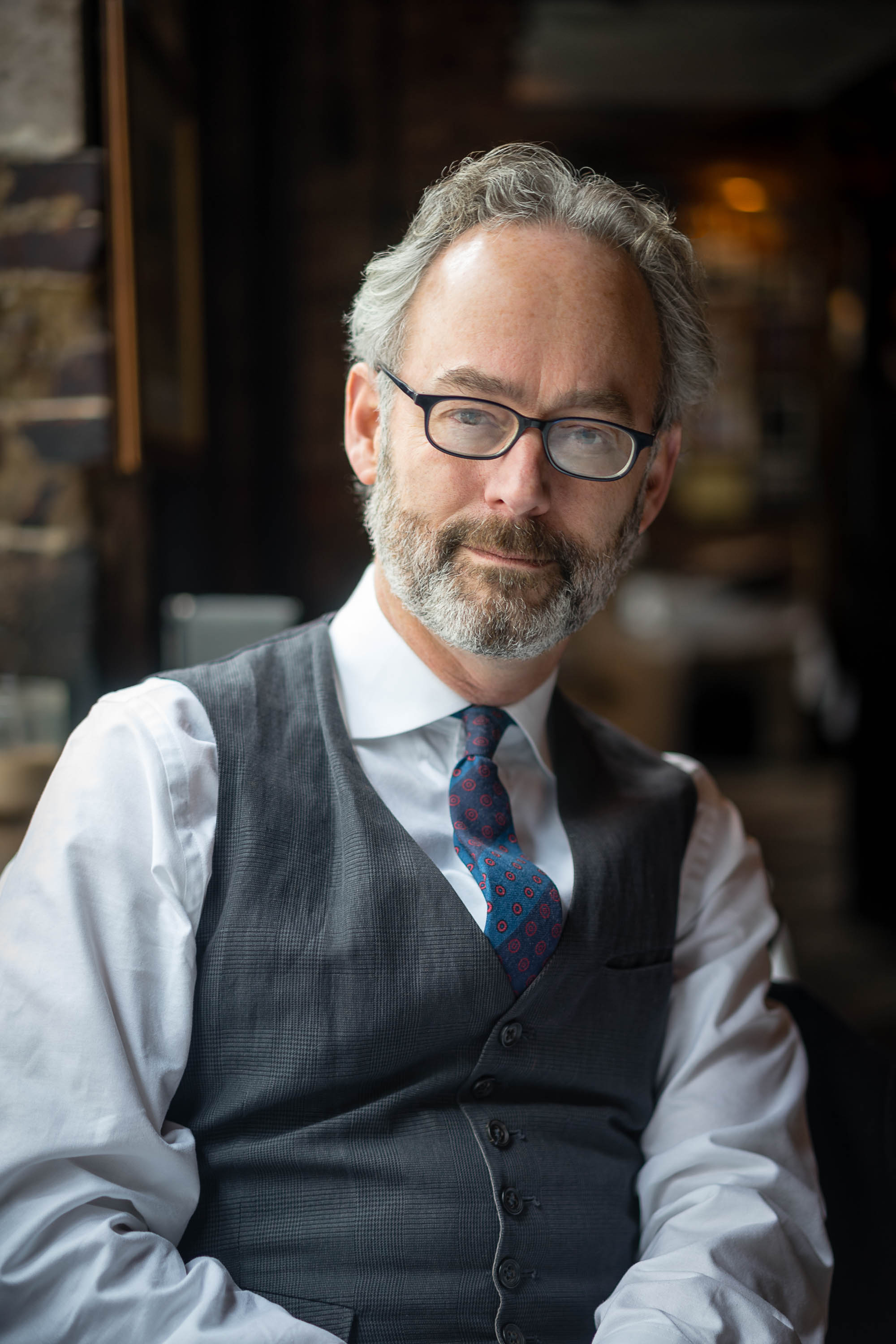
Photograph © David Jacobs
Amor Towles was born in Boston, but it is in Manhattan, New York, that you can find him at his desk writing compulsively, when inspiration haunts him and takes him on a new literary journey, always accompanied by a Martini.
As soon as he hears the first notes of Cole Porter he is fascinated by his inspired lyrics. The erudition and intellectual metaphors showed a different perspective to the young artist during the 1970s. This poetic milestone would mark his work forever.
He earned a BA from Yale College and a MA in English from Stanford University. He has been writing fiction from a young age, and even published the short story The Temptations of Pleasure in the Paris Review at the age of 25. But his work in the investment field eventually took him away from pen and paper for more than twenty years. It was thanks to the resounding success of Rules of Civility, published in 2011, that this author’s world changed. The book would be translated into more than 20 languages and received the 2012 Fitzgerald Prix, the year Towles decided to devote himself solely to writing, lucky for us. The talent had been in store since his youth, ready to blossom to captivate thousands of readers around the world. The fast pace of the writing, in a jazzy frenzy, lulls and surprises us. It is not surprising to find traces of Francis Scott Fitzgerald in the construction of the text and the characters, in addition to Towles immolating a glamorous and decadent time, such as the 1930s. This novel would spawn the spinoff Eve in Hollywood, about the life of the exuberant Evelyn Ross in Hollywood.
After recognition from critics and discerning readers, the author had open ground to present more novels, under the expectant gaze of the public. The novel A Gentleman in Moscow would cement this claim to literary apogee, with an exciting narrative that tells us so much about the beginning of the USSR, marked by public trials and the political paradigm shift. The forced imprisonment of Count Alexander Ilych Rostov in Moscow’s Metropol Hotel reminds us of the recent confinement of all civilization at home, even though the novel was published in 2016. This book was on the New York Times bestseller list, several newspapers hailed it as one of the best books of the year, translated into over 35 languages. On October 5 this year we will be able to read and contemplate his new novel, The Lincoln Highway, set in 1954 between Nebraska and New York.
We can still read several short stories Towles has published, where he always leaves us wanting to read more and more. A Whimsy of The World reveals the author’s admiration for Rome, Florence and Venice in an adventure in search of Ellie Watson’s whimsy. Katey Kontent, the main character in Rules of Civility, is a great reader and through her we can understand Amor Towles’ literary tastes, but now we will have the pleasure of meeting him in person.
Fill your Martini glass and get ready to enter the 21 Club in New York. Let’s talk.
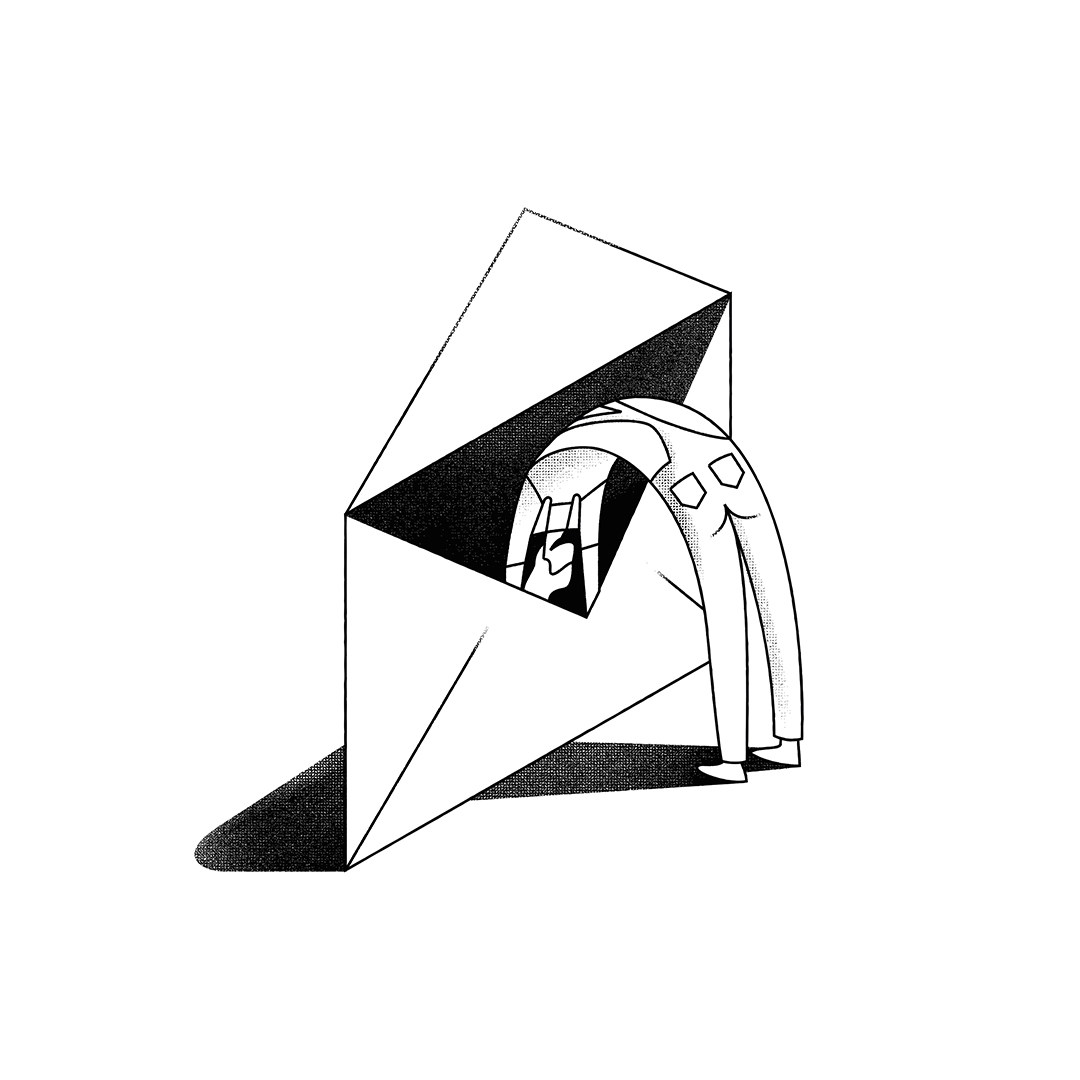
Illustration © Timo Kuilder
When you started writing what literary references did you have in your imagination? In your books we find echoes of Evelyn Waugh and Truman Capote, for example.
I have not read the works of Capote or Waugh, but I am well versed in the works of Edith Wharton, F. Scott Fitzgerald, Ernest Hemingway, Dashiel Hammett, etc. As a novelist, I don’t pick a topic, research it, then write a book. Rather, I pick a topic in which I already have a longstanding fascination. In terms of Rules of Civility, I’ve always had a great interest in the period between 1900 and 1940 – because it was an era of such incredible creative combustion.
In retrospect, the pace of change in the arts and industry in the 19th century seems pretty glacial. Painting, music, the novel, architecture were all evolving, but at a pretty observable pace. Then in the span of a few decades you have James Joyce, Nijinsky, Cubism, Surrealism, Jazz, Henry Ford, Sigmund Freud, the Russian Revolution, movies, airplanes, skyscrapers and the general upending of received forms in almost every area of human endeavor.
Over the years, I listened to the music, saw the movies, read the novels and manifestos, lingered in front of the paintings. So rather than doing any applied research for the story, I relied on my longstanding familiarity with the period as the foundation for my invention.
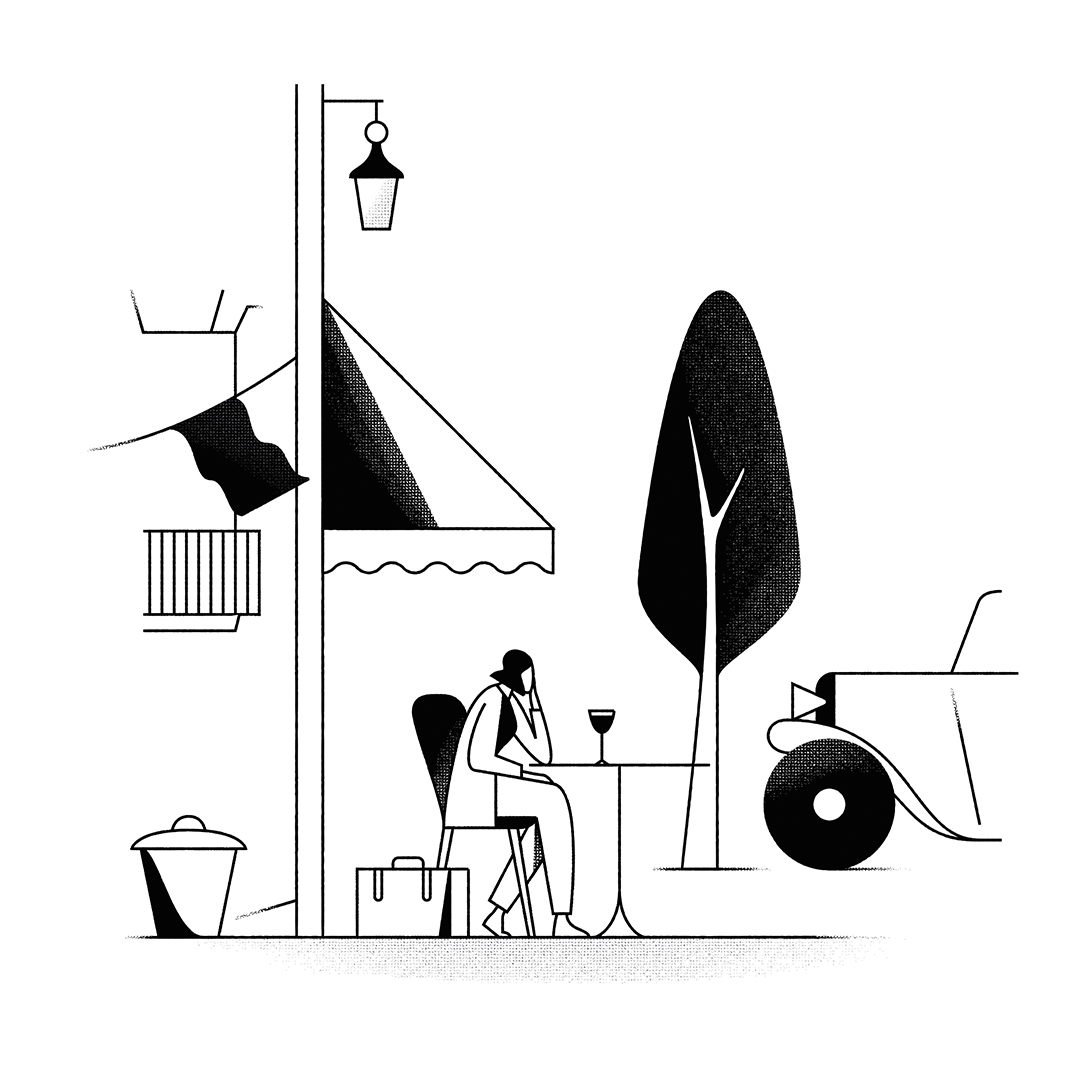
Illustration © Timo Kuilder
The paperback is giving way to other means of reading, such as the ebook and the audiobook. What is the importance of the physical book to you as an artistic object and a reading experience?
I only read physical books – because I always read with a pen in hand to underline, take notes. I also am enamored with the book as a physical object. That said, I know readers for whom audiobooks are the most satisfying way to take in literature, and others who prefer ebooks. Any medium you choose is fine by me.
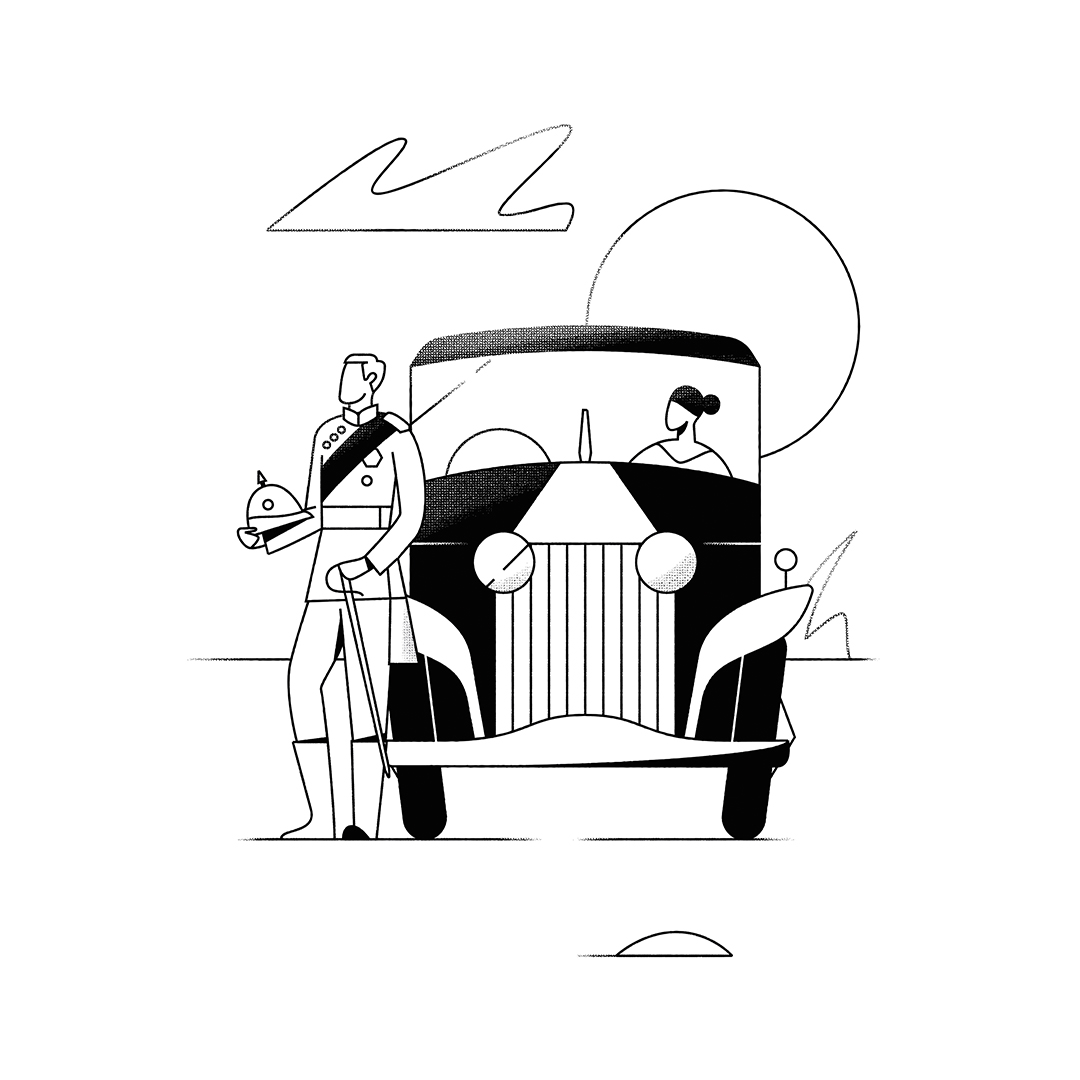
Illustration © Timo Kuilder
In your books you give great relevance to
the 1920s and the 1930s. When we return
to that time it brings us many similarities
with the current reality. The pandemic,
the economic crisis, are some examples of
that. What brings you closer to these full of
history decades?
My interest in writing about the early twentieth century is neither a reflection of a love of history, nor a nostalgia for a bygone era. What has attracted me to the period is that it has a proximate distance to the present. It is near enough in time that it seems familiar to most readers, but far enough away that they have no firsthand knowledge of what actually happened. This provides me with the liberty to explore the narrow border between the unbelievably actual and the convincingly imagined.
I generally like to mix glimpses of history with flights of fancy until the reader isn’t exactly sure of what’s real and what isn’t. In terms of A Gentleman in Moscow, for instance, the launch of the world’s first nuclear power plant in Russia in 1954 is an historical fact, but the assembly of Party leaders to observe the blacking-out of Moscow is an invention. Similarly, the little copper plates on the bottom of antiques designating them as property of the People are a fact, while the wine bottles stripped of their labels are a fiction.
![]()
Illustration © Timo Kuilder
In your novels, you often place many literary, musical, historical and cultural references, which shows enormous respect for the reader`s intellectuality. We really admire that characteristic in your writing. The mark you leave allows us to have a historical artefact in our shelves. Are you aware of this contribution?
I find it quite natural to weave cultural referen- ces into my work – as I think it is consistent with how we communicate in general. If you were to record the conversation at a dinner party in New York today, inevitably there would be references to editorials in the paper, a play on Broadway, the best series streaming on television, the movies, musical performers in the news or in town.
If used with care and consideration, cultural references and allusions serve as little doors in a narrative which look through to a different work that may be in thematic harmony with the principal work, or provide valuable contrast.
We know you are a great admirer of rock and the vinyl era. What music do you prefer listening to inspire your writing?
I often listen to music while I write. I don’t listen to music that is associated with the material I’m working on, rather I listen to music that sets me in a particular mood. Recently, I have been listening to the Fleet Foxes, the Bonny Light Horsemen, and Trampled by Turtles. I’m always listening to Dylan’s Blood on the Tracks and Van Morrison’s Astral Weeks. But I also listen to Bach, Mozart and Handel; and the jazz of the 1940s and 1950s.
![]()
Illustration © Timo Kuilder
You usually travel to a great extent through books. In these adventurous odysseys, which authors accompany you most and encourage your imagination?
For me, the three greatest novels are Tolstoy’s War & Peace, Melville’s Moby Dick, and Garcia Marquez’s One Hundred Years of Solitude. All three inspire me in terms of their scope, their originality, their poetics, and their overflowing sense of the human and the spiritual.
![]()
Illustration © Timo Kuilder
Your writing is very poetic, in a jazzy style and free to roam through verses by authors as dispersed as Joseph Brodsky or Fernando Pessoa. Is the beauty and lightness of writing something essential in the way you tell the story?
In crafting a novel, I do not have an essential message I am trying to communicate. Rather, I hope to create a work of art that, while being satisfyingly cohesive, contains such a richness of images, ideas, and personalities that it can prompt varied responses from reader to reader, and from reading to reading.
In essence, I want to gather together a pile of brightly colored shards of glass. But rather than assemble these shards into a mosaic with a fixed image, I want to drop them into the bottom of a kaleidoscope where, thanks to a glint of sunlight and the interplay of mirrors, they render an intricate beauty which the reader can reconfigure by the slightest turn of the wrist.
In pursuit of this goal, the greatest resource I have is the poetry of language. I am trying to unleash truth and complexity through poetics within a narrative structure.
![]()
Illustration © Timo Kuilder
Living only as a writer is very difficult these days, but it is a goal shared by many people, including me. What message do you want to give to young writers who hope to someday achieve your success?
Although I began writing as a youth and had my first short stories published when I was 25, I did not submit a novel publication until I was in my forties and had spent over fifteen years working as a professional in the investment field. So I would encourage young writers to pursue their craft in private for as long as is necessary. The number of hours one can write in a week is far less important than the consistency of writing a little every day.
The interview to Amor Towles was published on pages 88 to 93 in Through The Doors chapter of FITA Magazine Vol. I / Invisible Atlas dedicated to the city of Venice.
My interest in writing about the early twentieth century is neither a reflection of a love of history, nor a nostalgia for a bygone era. What has attracted me to the period is that it has a proximate distance to the present. It is near enough in time that it seems familiar to most readers, but far enough away that they have no firsthand knowledge of what actually happened. This provides me with the liberty to explore the narrow border between the unbelievably actual and the convincingly imagined.
I generally like to mix glimpses of history with flights of fancy until the reader isn’t exactly sure of what’s real and what isn’t. In terms of A Gentleman in Moscow, for instance, the launch of the world’s first nuclear power plant in Russia in 1954 is an historical fact, but the assembly of Party leaders to observe the blacking-out of Moscow is an invention. Similarly, the little copper plates on the bottom of antiques designating them as property of the People are a fact, while the wine bottles stripped of their labels are a fiction.
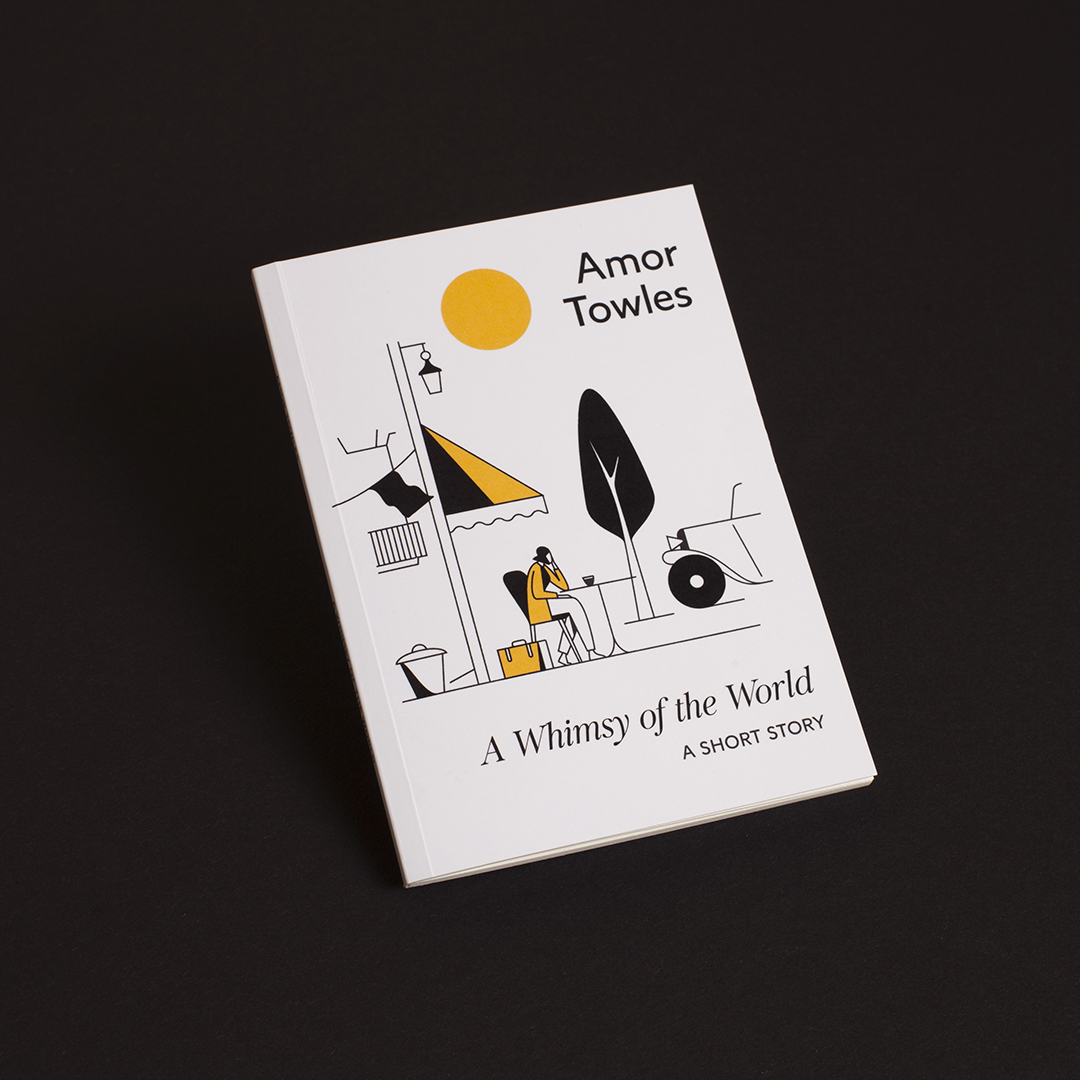
Illustration © Timo Kuilder
In your novels, you often place many literary, musical, historical and cultural references, which shows enormous respect for the reader`s intellectuality. We really admire that characteristic in your writing. The mark you leave allows us to have a historical artefact in our shelves. Are you aware of this contribution?
I find it quite natural to weave cultural referen- ces into my work – as I think it is consistent with how we communicate in general. If you were to record the conversation at a dinner party in New York today, inevitably there would be references to editorials in the paper, a play on Broadway, the best series streaming on television, the movies, musical performers in the news or in town.
If used with care and consideration, cultural references and allusions serve as little doors in a narrative which look through to a different work that may be in thematic harmony with the principal work, or provide valuable contrast.
We know you are a great admirer of rock and the vinyl era. What music do you prefer listening to inspire your writing?
I often listen to music while I write. I don’t listen to music that is associated with the material I’m working on, rather I listen to music that sets me in a particular mood. Recently, I have been listening to the Fleet Foxes, the Bonny Light Horsemen, and Trampled by Turtles. I’m always listening to Dylan’s Blood on the Tracks and Van Morrison’s Astral Weeks. But I also listen to Bach, Mozart and Handel; and the jazz of the 1940s and 1950s.
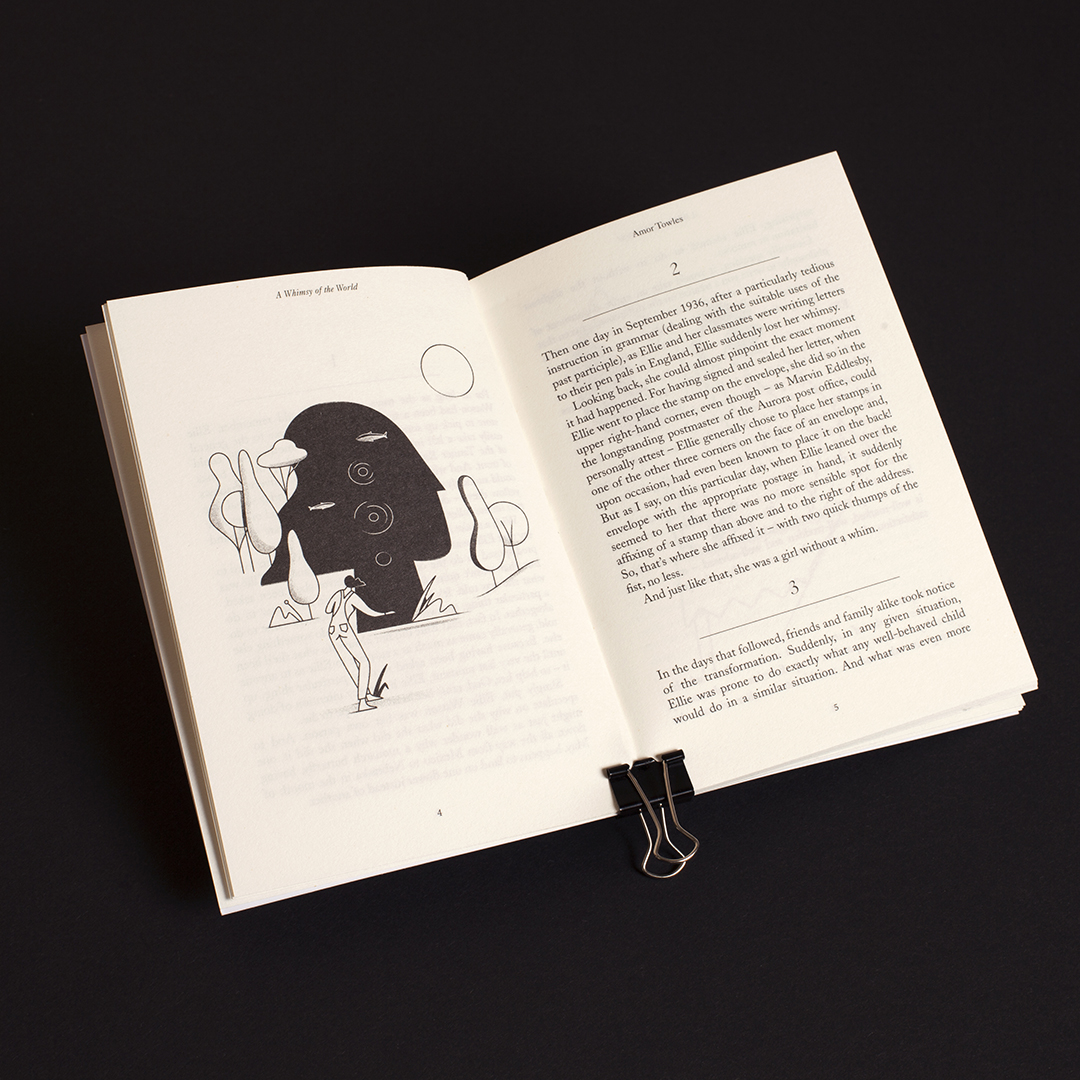
Illustration © Timo Kuilder
You usually travel to a great extent through books. In these adventurous odysseys, which authors accompany you most and encourage your imagination?
For me, the three greatest novels are Tolstoy’s War & Peace, Melville’s Moby Dick, and Garcia Marquez’s One Hundred Years of Solitude. All three inspire me in terms of their scope, their originality, their poetics, and their overflowing sense of the human and the spiritual.
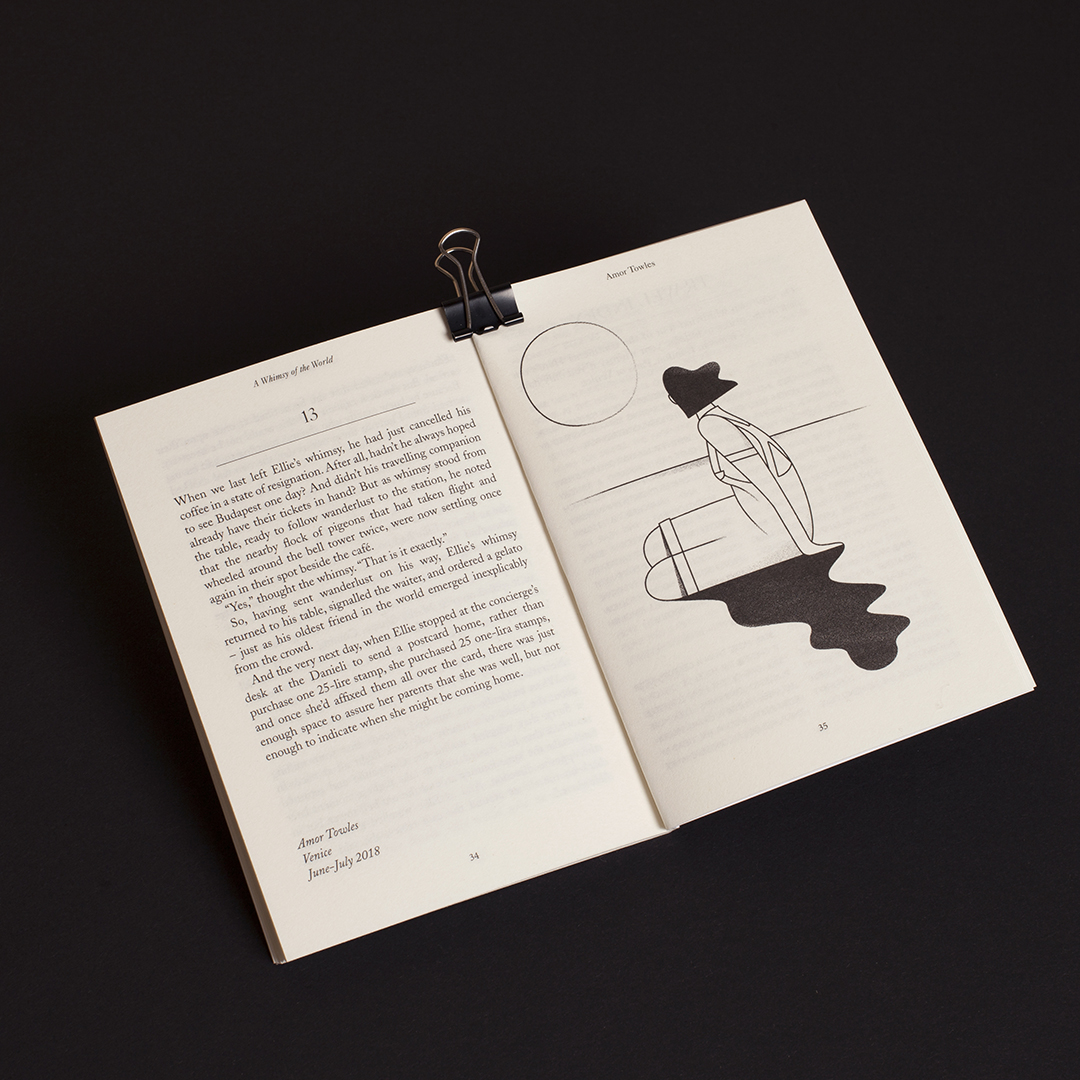
Illustration © Timo Kuilder
Your writing is very poetic, in a jazzy style and free to roam through verses by authors as dispersed as Joseph Brodsky or Fernando Pessoa. Is the beauty and lightness of writing something essential in the way you tell the story?
In crafting a novel, I do not have an essential message I am trying to communicate. Rather, I hope to create a work of art that, while being satisfyingly cohesive, contains such a richness of images, ideas, and personalities that it can prompt varied responses from reader to reader, and from reading to reading.
In essence, I want to gather together a pile of brightly colored shards of glass. But rather than assemble these shards into a mosaic with a fixed image, I want to drop them into the bottom of a kaleidoscope where, thanks to a glint of sunlight and the interplay of mirrors, they render an intricate beauty which the reader can reconfigure by the slightest turn of the wrist.
In pursuit of this goal, the greatest resource I have is the poetry of language. I am trying to unleash truth and complexity through poetics within a narrative structure.
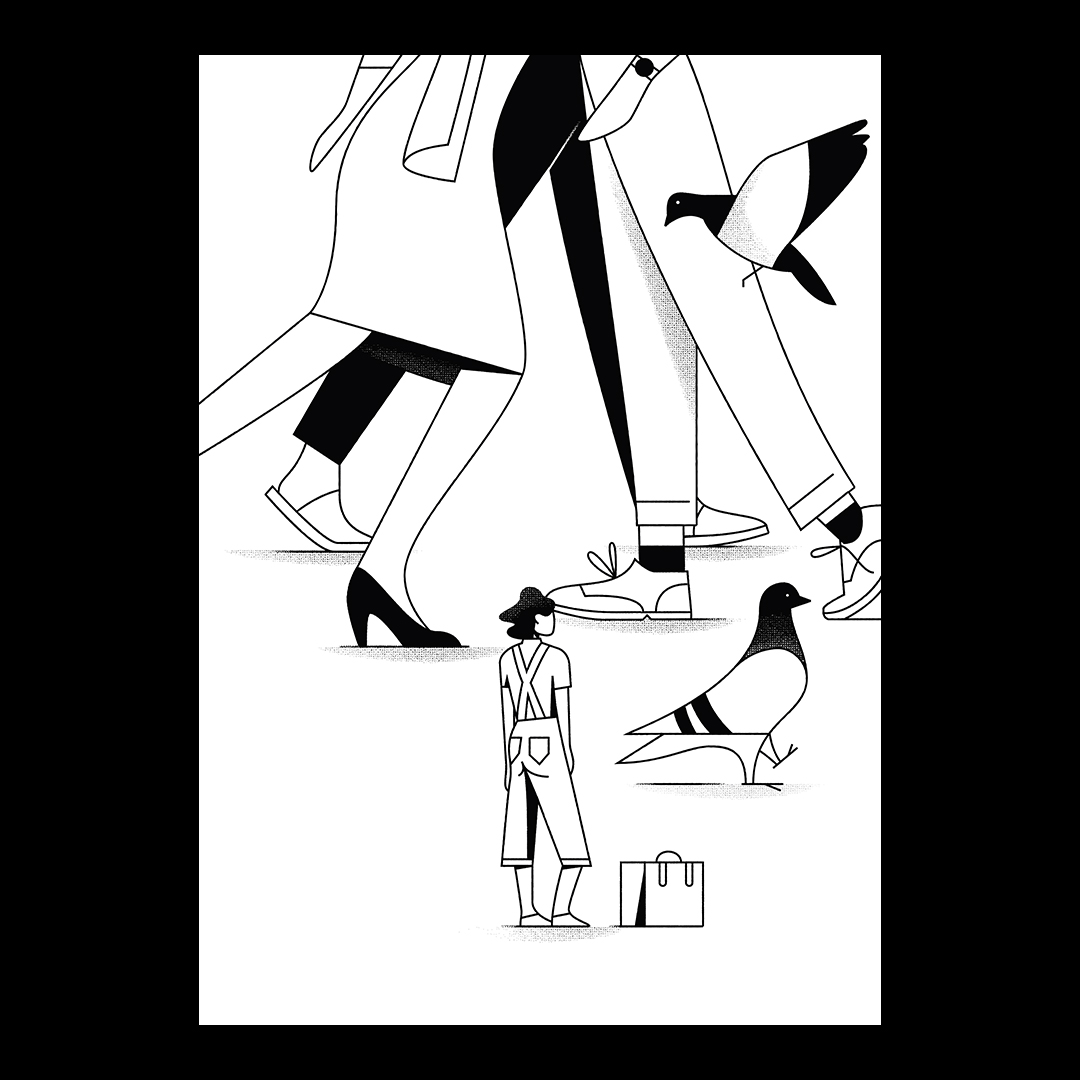
Illustration © Timo Kuilder
Living only as a writer is very difficult these days, but it is a goal shared by many people, including me. What message do you want to give to young writers who hope to someday achieve your success?
Although I began writing as a youth and had my first short stories published when I was 25, I did not submit a novel publication until I was in my forties and had spent over fifteen years working as a professional in the investment field. So I would encourage young writers to pursue their craft in private for as long as is necessary. The number of hours one can write in a week is far less important than the consistency of writing a little every day.
The interview to Amor Towles was published on pages 88 to 93 in Through The Doors chapter of FITA Magazine Vol. I / Invisible Atlas dedicated to the city of Venice.

